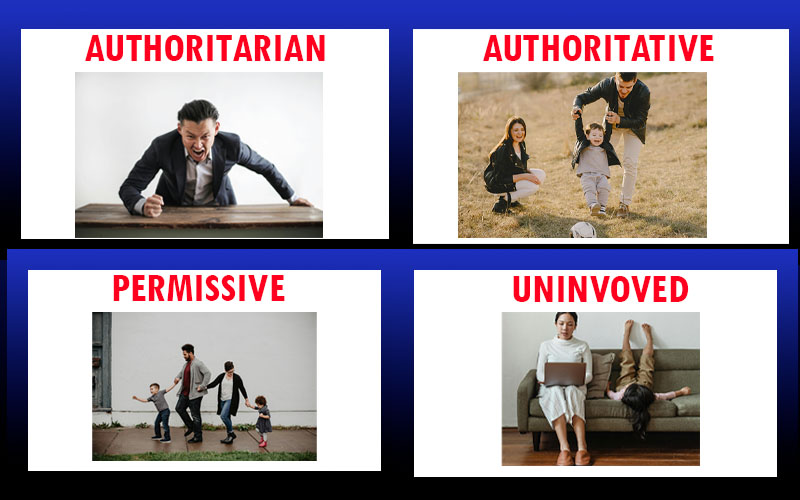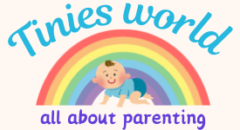What are the different styles of parenting
Parenting styles are different for every parent. Which type of parenting style do you apply on your child? Which type of parenting style have your parents have applied to you?
It can be authoritative, authoritarian or neglectful. So, let’s elaborate on the topic in detail.

Parenting is something which can’t be classified . Every person is different and parents know better about their child. However, Psychologists have classified parenting styles into four types; authoritarian, authoritative, permissive, and uninvolved.
1. AUTHORITARIAN:
Are you or your parents sounds like anyone of the statements ?
- You believe kids should follow your rules and they can’t say no .
- You consider your child’s feeling as an excuse.
- You find that sometimes you get angry on certain small things which can be handled patiently
- You think love and affection can spoil your child.
If any of these statements is true , you might be authoritarian parent. These parents are so much addicted to rules and discipline that they lack sympathy for their children. They often favour punishment so that the child afraid of doing same mistake again. The best example is a commander of army who enforce rules on his cadets without communicating with them. Authoritarian parents take over the decision-making power, rarely giving children any input in the matter.
How authoritarian parenting affects children:
You can find these children very well behaved and obedient in front of their parents. But when they are outside or alone they can be introvert, lack of confidence, confused and many times bullied by their classmates or friends. Children may also suffers from the following:
- Social skills are poor
- Confused about their own behaviour
- Poor decision making
- Poor judge of character
- Anxiety or depression
Example:
Situation: The child wants to stay out later than usual on a weekend night.
Authoritarian Response:
- Parental Approach: The parent firmly says no without discussion, enforcing a strict bedtime rule. The parent emphasizes that rules are rules and there is no room for negotiation.
- Dialogue: “You need to be home by 9 PM, and that’s final. There’s no discussion about it. I don’t care if your friends are staying out later; you have to follow this rule.”
Impact on Child: The child may comply with the rule but might feel resentment or frustration. They might also struggle with autonomy and understanding the reasons behind rules.
2. AUTHORITATIVE :
Are you or your parents sounds like anyone of the statements ?
- You always praise your child when they do well and politely tells them when they do mistakes
- You know how to draw boundary between rules and opinions.
- You explain your reasons behind rules you impose
- You give them rewards and appreciates them always
If any of these describes you then congratulations because your kids are having best parents. These kids are raised well and tends to be happiest. The parents are very clear with their thoughts and for kids there is always room for sharing thoughts and feelings. These parents never impose rules ,but make their children aware of importance of rules in their life.
How authoritative parenting affects children
The children with authoritative parenting are confident, happy and very clear about their future. They exhibit high level of self-esteem which is why most of them becomes successful in their life.
Kids with authoritative parents have the following positive outcomes:
- Strong bond with parents
- Ability to manage stress and anxiety
- They are good in making friends
- Clarity of thoughts
- They have good social skills
Example:
Situation: A child is struggling with homework and is frustrated about a difficult math problem.
Authoritative Response:
- Parental Approach: The parent sits down with the child and offers support by discussing the problem. They encourage the child to think critically and try different strategies to solve it. The parent also praises the child’s effort and encourages a positive attitude towards challenges.
- Dialogue: “I see you’re having trouble with this math problem. Let’s look at it together. What strategies have you tried so far? Remember, it’s okay to make mistakes as long as we learn from them. How about we break the problem into smaller parts and tackle it step by step?”
Impact on Child: The child learns problem-solving skills, feels supported, and develops a positive attitude towards overcoming challenges.
3. PERMISSIVE :
Are you or your parents sounds like anyone of the statements ?
- Your rules are not followed by your kids
- You don’t put much effort in making them understand .
- You are like friends to them and there is no space for discipline
- You are okay with whatever they want they can have, even it is not good for them
If any of these statements describes you then you might practice Permissive Parenting. These parents are often of very easily forgiving nature when kids to mistakes. They treat their kids equal just like friends.
How permissive parenting affects children
Children of Permissive parents are often seen struggling with rules and regulations. This is the reason that they often face behavioural issues . Some other issues they faces are :
- Lack of responsibility
- Poor in decision making
- Impulsiveness and aggressiveness
- Unable to do time management
- Anxiety and depression
- Academic struggles
Example:
Situation: The child wants to skip their schoolwork to play video games all afternoon.
Permissive Response:
- Parental Approach: The parent agrees to let the child play video games and does not enforce the completion of schoolwork or set any limits. The parent prefers to avoid conflict and maintains a friendly relationship with the child.
- Dialogue: “Sure, you can play your video games all afternoon. If you don’t feel like doing your homework right now, that’s okay. You can do it later or whenever you’re ready.”
Impact on Child: The child may struggle with time management and responsibility, and may have difficulty understanding the importance of balancing fun with obligations.
4. UNINVOLVED OR NEGLECTFUL:
Do any of these statements sound familiar to you ?
- You don’t ask your child about school or homework.
- You rarely know where your child is or who they’re with.
- You don’t spend much time with your child.
- You don’t have many rules and expectations.
If any of these statements describes you then you might practice Uninvolved Parenting. These parents are typically disengaged and may focus more on their own needs rather than their children’s needs. They often show little interest in their children’s lives and may provide minimal supervision and support.
How uninvolved parenting affects children
Children may feel unloved or unimportant, leading to poor self-esteem and self-worth. Some other points to be mention are:
- Behavioural issues
- Rebelliousness
- can become alcoholic or drug addicted
- Lower cognitive and emotional empathy
- Diminished self-esteem
Example:
Situation: The child has been neglecting their schoolwork and is often left alone at home for extended periods.
- Parental Approach: The parent is largely uninvolved in the child’s education and daily activities. They rarely check in on the child’s school progress or provide emotional support, and are often preoccupied with their own issues.
- Dialogue: (If asked about schoolwork) “I’m too busy right now. Just do whatever you think is best. I trust you’ll handle it.”
Impact on Child: The child may experience feelings of neglect and lack of support, which can affect their emotional well-being and academic performance. They might struggle with self-discipline and forming healthy relationships due to the lack of guidance and involvement.
Comparison of all four parenting styles:
Certainly! Here’s a comparative table of the four primary parenting styles, highlighting their characteristics, approaches, and potential impacts on children:
| Aspect | Authoritative | Authoritarian | Permissive | Neglectful (Uninvolved) |
|---|---|---|---|---|
| Characteristics | High responsiveness and high demands | Low responsiveness and high demands | High responsiveness and low demands | Low responsiveness and low demands |
| Rules and Expectations | Clear, reasonable rules with explanations | Strict rules with little explanation | Few rules or expectations, minimal structure | Minimal rules or structure, lack of guidance |
| Communication | Open and two-way; encourages discussion | One-way; expects obedience without discussion | Minimal; more of a friend than a parent | Minimal; often disengaged and distant |
| Discipline | Uses reasoning and understanding; seeks to teach | Uses strict punishment; focuses on control | Rarely disciplines; tends to avoid conflict | Inconsistent or absent discipline; neglectful |
| Support and Nurturing | High support; emotionally involved and encouraging | Low emotional support; focuses on obedience | High emotional support; indulgent and lenient | Low support; emotionally distant and disengaged |
| Impact on Self-Esteem | Often high; children feel valued and understood | Can be low; children may feel inadequate or unworthy | Can be high; children may feel overly self-confident | Often low; children may feel unloved or neglected |
| Behavioral Outcomes | Generally positive; children are well-adjusted and disciplined | May be negative; children might be rebellious or compliant | Can be problematic; children may struggle with boundaries | Often negative; children may exhibit behavioral issues |
| Academic Performance | Generally strong; children are motivated and engaged | May be good but can also lead to pressure and anxiety | Can be poor; children may lack motivation or structure | Often poor; children may lack support and guidance |
| Social Skills | Generally strong; children learn to interact well with others | Can be weaker; children might struggle with social interactions | Can be strong; children may be friendly but lack boundaries | Often weak; children may struggle with relationships and social norms |
| Independence | Encouraged; children learn to make decisions and take responsibility | Often restricted; children may struggle with autonomy | Often encouraged; children may have excessive freedom | Often restricted; children may lack self-discipline and independence |
| Long-Term Effects | Positive; children tend to be resilient, well-adjusted, and capable | Can be negative; children might face challenges in relationships and self-esteem | Can be mixed; children may struggle with boundaries but feel loved | Often negative; children might have issues with mental health and relationships |
This table provides a broad overview and generalization, and individual experiences may vary based on other factors such as cultural context and personal circumstances.
Summary:
Parenting styles significantly shape a child’s development, each with distinct impacts. Authoritative parenting balances high responsiveness with high demands, fostering an environment of clear rules, supportive guidance, and open communication. Children raised this way often develop high self-esteem, strong social skills, and excel academically. Authoritarian parenting, in contrast, is characterized by high demands but low responsiveness, emphasizing strict rules and obedience with limited explanation or emotional support. This can lead to children who may struggle with self-esteem and social interactions, although they might perform well academically under pressure. Permissive parenting involves high responsiveness but low demands, where parents are lenient and act more like friends. While this can result in children with high self-esteem and creativity, they often struggle with self-discipline, boundaries, and academic performance due to the lack of structure. Neglectful (uninvolved) parenting is marked by low responsiveness and low demands, with minimal interaction and guidance. This style often leads to children facing low self-esteem, emotional instability, and academic and social challenges, potentially resulting in long-term issues with relationships and mental health. Each style influences a child’s emotional and behavioral development differently, underscoring the importance of a balanced and involved approach to parenting.
